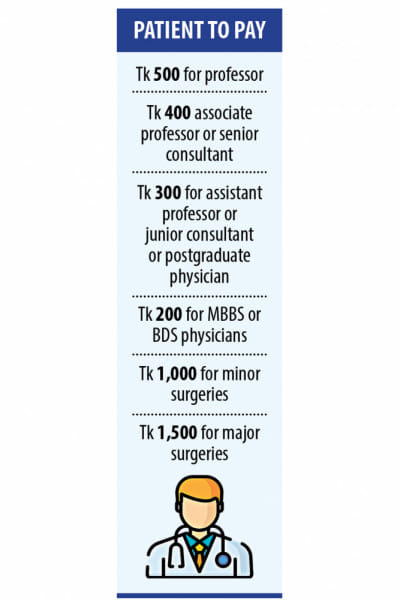Afternoon Outpatient Services: Good step


Patients have mostly praised the afternoon outpatient services initiated at some public hospitals on a pilot basis though concerns remain about its long-term sustainability due to the severe shortage of physicians and other healthcare staffers.
When the 3:00pm-6:00pm services in 12 district hospitals and 39 upazila health complexes began on March 30, the government step was welcomed by patients.
But it is far from fulfilling the expectations as almost 40 percent of the posts of physicians -- from ninth-grade medical officer to fifth-grade senior consultant -- remain vacant in those 12 district hospitals.
Most of the posts of senior consultants are also unfilled in these hospitals, according to the Directorate General of Health Services (DGHS) database.
Some of these hospitals have no radiologist or pathologist against one sanctioned post, leaving the hospital's laboratory and imaging service in a dire situation.
Except for the 100-bed district hospitals in Thakurgaon, Rajbari and Khagrachhari, nine others have been upgraded to 250-bed facilities but without sanctioning any new workforce.
The Daily Star can estimate that the nine hospitals don't have around 70 percent of the manpower required by proposed "standard set-up" of the DGHS.
The Manikganj District Hospital has been struggling to ensure quality service to the patients during the morning shift with 42 physicians. The facility needs around 150 physicians as per the DGHS standard.
"We do not even have an adequate number of physicians and other staffers to run even a 100-bed hospital. But it is now a 250-bed hospital. So, it is very difficult to serve outpatients in the afternoon," Dr Mohammad Bahauddin, the hospital superintendent, told The Daily Star.
Zahid Nazrul Chowdhury, the superintendent of Naogan District Hospital, where afternoon service is available two days a week, shared a similar view.
We have introduced the afternoon outpatient service on a pilot basis to find out the shortcomings. We will try to address all the issues.
"We have only one pathologist and one lab technician. It is not possible for anyone to work 8:00am to 6:00pm daily," he said.
The Thakurgaon hospital authorities also provide the service only two days a week as they were already struggling to operate the morning shift.
Despite this, The Daily Star received mostly positive feedback from the patients after visiting half a dozen district hospitals and two upazila health complexes recently.
Forty-three-year-old Mizanur Rahman from Moheshkhali was very happy after consulting an otolaryngologist during an afternoon service hour at Cox's Bazar Sadar Hospital.
He had to pay Tk 300 for the consultation service. The same consultant charged Tk 800 at a private diagnostic centre where he had taken his son earlier.
"This is impressive. If the government strengthens the service, it will greatly help people," said Mizanur Rahman.
On the other hand, a patient who came to show his diagnosis report had to go back as his physician was not present on the second day.
District hospitals in Rajbari, Feni and Jamalpur served 15-20 patients daily in the first week of the service.
Officials at the district hospitals in Khagrachhari, Bhola and Jhenaidah had almost a similar experience while the patient rush was low in Manikganj, Naogaon and Thakurgaon.
"The majority of people still don't know about the new service. When they know, the rush will increase," Dr Monirul Islam, superintendent of the Bhola District Hospital, told The Daily Star.
In this hospital, a team of around 15 physicians comprising gynaecologists, cardiologists and medicine specialists have been assigned as per a weekly roster.
The pathological laboratories have also been kept operational from 3:00pm to 6:00pm, he said.
Dr Sheikh Daud Adnan, DGHS director (hospitals and clinics), told The Daily Star, "We have introduced the afternoon outpatient service on a pilot basis to find out the shortcomings. We will try to address all the issues."
He said three components -- human resources, equipment and infrastructure -- are mandatory to strengthen the hospital services.
"Infrastructure development is almost complete while the health ministry is now working to ensure necessary equipment and deployment of human resources."
He added that creating new posts require approval from the public administration ministry, and the process is underway.
Some experts, meanwhile, remained critical of the step.
"The government has undertaken this programme to make people feel happy about them ahead of the election. No homework was done before introducing it," said Prof Dr Rashid-E-Mahbub, former president of Bangladesh Medical Association.
Under the new initiative titled "Institutional Practice", a patient has to pay Tk 500 to get a consultation with a professor, Tk 400 with an associate professor or senior consultant, Tk 300 with an assistant professor or junior consultant or postgraduate doctor, and Tk 200 with MBBS or BDS doctor.
A portion of the fees, Tk 25 to Tk 50, will be paid to the supporting staffers while an equal portion will be taken as service charge for hospitals.
In addition to the consultation services, patients will get diagnostics and laboratory, surgical, and procedures like endoscopy, colonoscopy, echocardiogram, etc.
The patient will pay Tk 1,000 for minor surgeries while Tk 1,500 for major ones.
While inaugurating the initiative, Health Minister Zahid Maleque said the government service will be expanded to all public hospitals if "people like it".
[Our correspondents from the respective districts have contributed to this report]

 For all latest news, follow The Daily Star's Google News channel.
For all latest news, follow The Daily Star's Google News channel. 








Comments